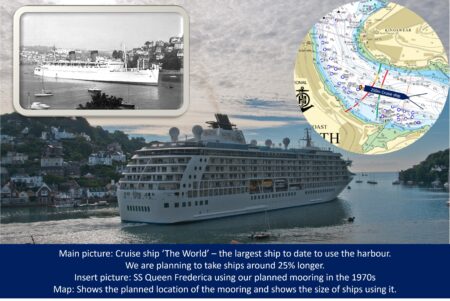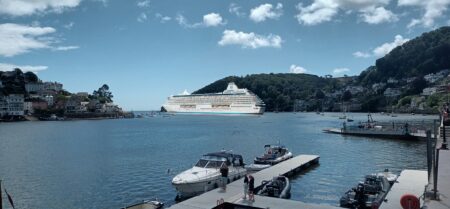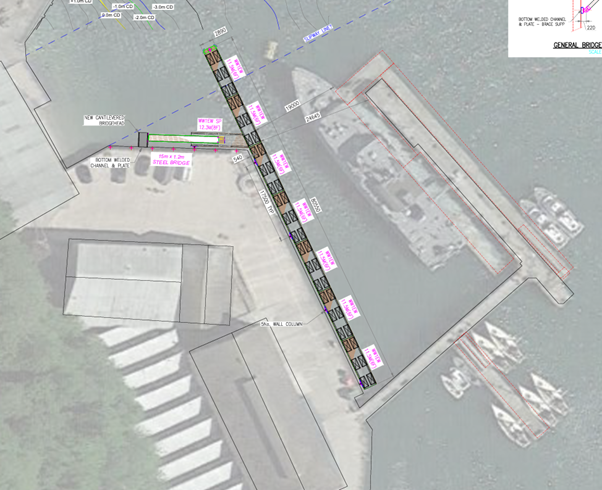Update: Sept 2024
We have had a very strong reaction from local people, some in favour, some against our proposals, and many requests for more detail on aspects of the proposal, particularly from an environmental point of view. We have reached the conclusion that it is not practical to provide this level of detail in time to install the mooring for the 2025 cruise season, and have also decided that, given the limited resources available to an organisation of our size, we will pause work on this project, allowing us to progress some of our other priorities.
We do still see real benefits in reinstating the mooring in this location, though there are challenges to address. We intend to publish a detailed study in due course, though this will not be before the end of 2025. This will use all the comments, questions, messages and data received to date. There will be further extensive consultation between the publication of the study and a final decision being made, and all who have responded to date will be notified.
We would like to reassure you that we take the views of all of our stakeholders into full account when planning any development on the river and would like to thank you for getting involved in our consultation.
Join the cruise ship conversation
We are developing plans to grow the cruise business in Dartmouth, detailed below. We’d love you to share your experience, ideas and concerns, and help us understand how our plans can best be shaped to benefit Dartmouth. We have an online survey at
surveymonkey.co.uk/r/dartcruise , and you are also welcome to come and chat about this proposal in the harbour office, to email
[email protected] or to attend our workshop on 31st August at 18:30 in the Dartmouth Guildhall.
2023 has seen around a dozen cruise calls in Dartmouth, as well as many other large vessels such as tall ships and superyachts. We have had many positive comments about the spectacle of larger vessels in the river, with lots of people out and about on the quaysides and taking pictures. We also had questions as to why larger ships needed to remain at anchor outside the river.
.
Dart Harbour would like to encourage more cruise ships to visit Dartmouth, by reinstating a former mooring for mid-sized cruise ships to the south of the Lower Ferry, which we are calling MS-0 buoy. This mooring was last used in the 1970s. Ships will enter the river stern-first with pilot and tug assistance, and will moor their stern to the new buoy, with their bow held in place with the ship’s anchors. A similar technique is used in Fowey and works well. The ships will tender ashore to the Town Jetty as today.

This will lead to around £3 million annual benefit to the local area by 2030, when we would expect to have around 20 cruise ships using the mooring per year. Businesses such as shops, cafes and ferries have told us about increased revenue on cruise ship days, and we believe this will continue to increase with more ships, with benefits also being felt by tourist attractions, marine businesses, tour guides and transport providers amongst others. We plan to have a ‘Cruise Forum’ meeting regularly to help local businesses make the most of cruise ships.
.
We do not want to overload the town, and will have controls in place on the size of ship, number of calls per year and the environmental impact. Cruise calls tend to be outside of the peak school summer holidays, when the town has plenty of space, and cruise passengers do not use up parking spaces or housing in the town, so they are an ideal fit for Dartmouth. By 2030 we would hope to be bringing around 25,000 cruise passengers to the town annually – around 10% of the number that arrive by steam train. We will have a passenger limit to prevent overcrowding.
.
Contrary to common belief, cruise ships do not pollute the water in ports, with no discharges of waste. They do have a significant carbon footprint, but the industry is making great strides to reduce this, and the more modern ships we would be attracting are much more efficient. CO2 is a global rather than a local pollutant, so the impact on Dartmouth would be no different to if the ship was in a different port. For many people, large ships in the harbour enhance the views of this vibrant port, whilst others may be concerned. The location we have chosen for MS-0 buoy will minimise the impact on views, and we will also limit the total number of calls per year.
.
We are carrying out simulator trials, and expect that ships of up to around 250m in length (as shown in above composite photo) will be able to use the harbour safely, and without significant impact on other river users or the local community. The manoeuvre to the new mooring is expected to be somewhat simpler than to the current mainstream moorings, and the water is much deeper. There will still be ample space for other boats to pass, and only two yacht moorings in this area will be impacted. We won’t allow cruise calls on this mooring during regatta, or RDYC regular scheduled racing without the agreement of the clubs involved.
.
Dart Harbour is a trust port – we don’t make any profit, but instead re-invest in operating and improving the Dart Estuary. The income from these ships will help with this work – at around £300,000 per year by 2030 we would expect this income to make up around 15% of our annual budget. We plan to ring fence some elements of this additional income for use on environmental projects on the Dart Estuary, and as contributions to the Dart Harbour Communities fund, which is used to help support organisations encouraging young and disadvantaged people to experience the river and its surroundings. More larger ships also increases our resilience, diversifies the harbour, and increases our team’s skill.
.
This page is a brief summary of our plans – if you would like further details there is more information in this document.
Cruise-Ships-In-Dartmouth.pdf .
Join the cruise ship conversation
Share your experience, ideas and concerns, and help us understand how our plans can best be shaped to benefit Dartmouth.


